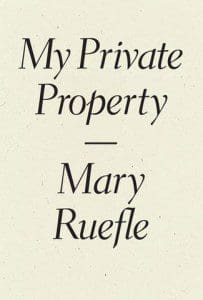 …there is the poem as a unit-like thing, and then there is the poem that pervades existence, which is much more like the wind, and that is the poem everyone senses from time to time, whether they can read or not, whether they ‘care’ about the unit-like thing or not.—Mary Ruefle, from a 2013 interview with Andrew David King in Kenyon Review
…there is the poem as a unit-like thing, and then there is the poem that pervades existence, which is much more like the wind, and that is the poem everyone senses from time to time, whether they can read or not, whether they ‘care’ about the unit-like thing or not.—Mary Ruefle, from a 2013 interview with Andrew David King in Kenyon Review
It’s hard to define a poem these days. But whether you call the short pieces in Mary Ruefle’s new book, My Private Property (128 pages; Wave Books), poetry or prose poems or essays or flash fiction or mediations or whatever, I’m hooked on them. They “go down a treat” I might say if I were British and lived in the last century. And they are deceptively simple.
Simple, that is, until you try to figure out how she does it. How does she create a tone at once distanced and intimate? Straightforward and offbeat? Mary Ruefle’s mind is on display here in all its quirky richness. If you don’t know her erasure books, her essays, or her earlier books of more conventionally lineated poetry, starting with My Private Property will give you the essential flavor of her work.
Rather than try to explain what she does, here are a few samples. First an extract from “Pause,” about (in part—one can never confidently say “about” regarding a piece of Mary Ruefle’s) menopause:
It may be that you recall your thirteenth year on earth. Menopause is adolescence all over again, only you are an adult and have to go out into the world every day in ways you did not have to when you were in school, where you were surrounded by other adolescents, safe, or relatively so, in the asylum of junior high.
It’s the asylum of junior high that jumps out here, as well as the structure of the sentence—clear but also complex, as Ruefle’s sentences often are.
The next is from “Lullaby,” about her falling asleep at a concert. The piece then meanders through Giacometti’s drawings, then Henry Miller’s repeated use of the word “cunt” (which can also put you to sleep), finally resolves:
I mean really, what can you do? You can listen to Brahms, you can look at Giacometti, you can read Henry Miller, but each will tell you in his own way that there is nothing, absolutely nothing, but the stars looking down on you, even when you think you are looking up. How heavy-handed I feel just writing this, how heavy my hand feels, how heavy my eyes, my very hair is dragging me down, but it is a truth and if you sleep through a truth you will but wake at the bitter end.
There is something in the movement of that passage, the shifts from the grand and abstract to the personal, the extension of the metaphor of heavy handedness that is part of Ruefle’s art. Her segues are at once surprising and inevitable—they challenge assumptions, wake up the lazy brain by always going someplace unexpected, move with an absolute, intrinsic logic. For me, the phrase “the stars looking down on you, even when you think you are looking up” is the kind of delicate, deliberate reversal that entrances me.
Ruefle can be serious, too, as in the title piece, “My Private Property”, which is somewhat about shrunken heads, loneliness, privilege and interconnection. Here is one short passage:
…I can assure you my school did not teach what I now know to be true—that the museum I wandered in was built on rape and plunder and pillage and oppression and murder, that everything in it was stolen, that the very wealth necessary for such acquisition was stolen, wealth acquired by force of so filthy and unspeakable an evil our heads cannot fathom it and have no single word for it, but must resort to endless corridors of words, each corridor turning into another corridor a thousand miles longer than the last in our hopeless search for some inner chamber of understanding that does not exist.
More than any rant or political discourse, those corridors of endless words drive home the nature of the historical shame we share. That shame, along with our foibles, is always delineated with wit and a certain forgiveness, an acknowledgement of our shared humanity. But stating it baldly like this is very un-Ruefleian; she would never countenance it. Maybe this is better: we are not let off the hook, but rather hooked, landed and thrown back.
I think my favorite piece in the book is called “The Gift,” about, in part, ordering something to arrive from afar, a delicious ramble with a wonderful ending. But it’s too long to quote here, and so much a whole that it wouldn’t work to quote part of it.
In fact, talking about Mary’s work is like dancing about architecture. You just have to read the book yourself. And don’t neglect the author’s note at the end.
